#cmj magazine
Explore tagged Tumblr posts
Text


Fiona Apple, photo: Chris Cuffaro
115 notes
·
View notes
Text

CMJ New Music Monthly ; 1999
21 notes
·
View notes
Photo

Beck for CMJ New Music Magazine, November 1999
Photo by Charlie Gross
13 notes
·
View notes
Text

0 notes
Text
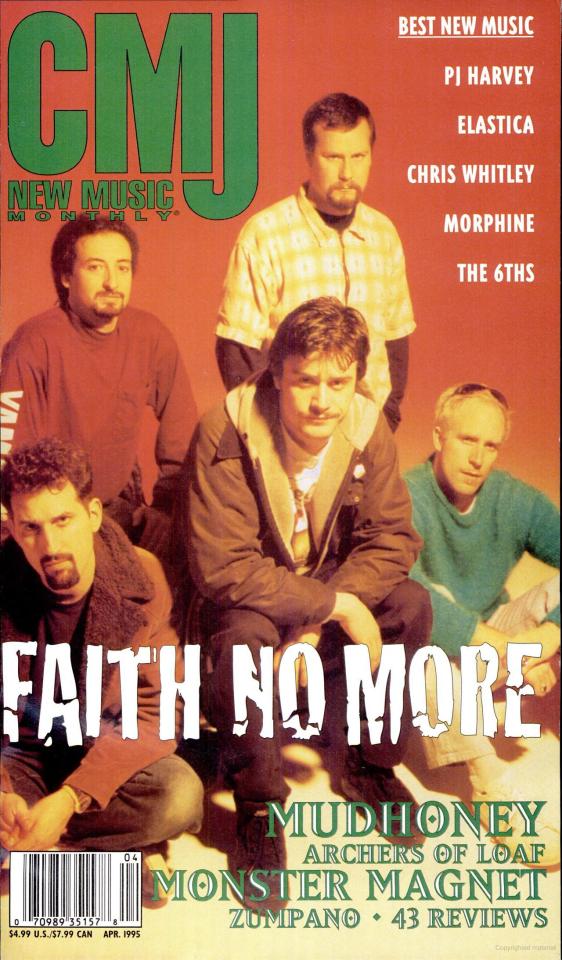
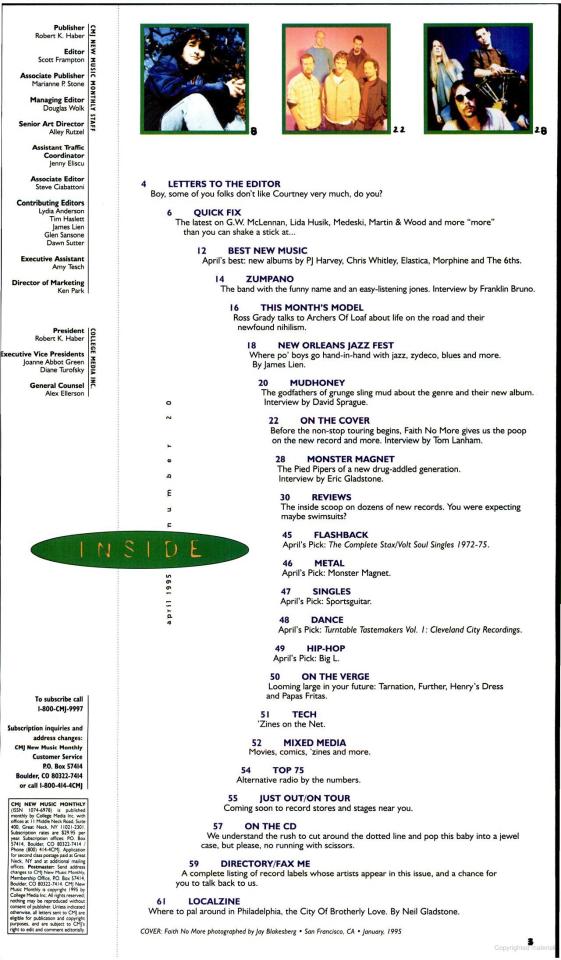


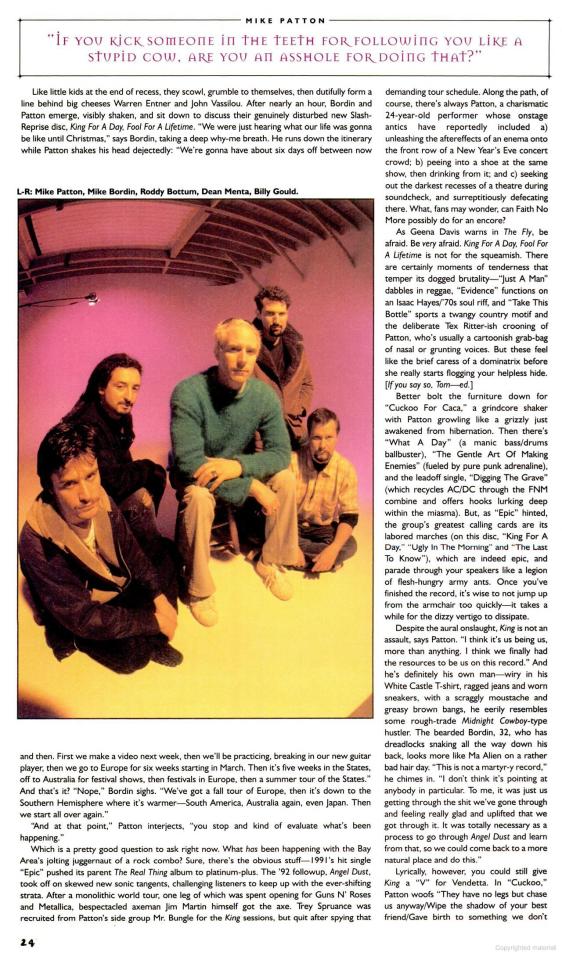

Faith No More Tom Lanham interview in CMJ New Music Monthly magazine with photos by Jay Blakesburg, April 1995 [X]
#faith no more#dean menta#mike bordin#mike patton#billy gould#roddy bottum#1990s#1995#90s#pics#soupy's#magazine#music#musicians#CMJ#jay blakesberg
19 notes
·
View notes
Text
Matt Bellamy Interview - Muse [ROCKIN'ON (September 2000)]


"The ideal is to keep pushing forward and go on and on and on and on and die in the end….. What I want to do is act out that ideal."
The new generation of guitar band supernovas, Muse, have finally broken through in their home country of the UK. We caught up with Matt Bellamy just before Summer Sonic to find out more about the hyper nuclear explosion he is about to cause on stage. Interview by Erika Yamashita
Matt Bellamy is 22 years old. On the day of the interview, he had not returned from Glastonbury for a long time. When he finally got back, he got into a big fight with his sweetheart, who had been with him since he was 15, over whether he was going to Wimbledon or not. After all that, a phone call came into our waiting mobile phone, saying "We've broken up", which was not even an excuse (Of course, after this interview, he went to Wimbledon in his girlfriend's car). A genius boy is still a boy.
If a genius is born of talent plus environment, he is a very good test case indeed. A boring hometown, a complicated family environment thrown in at the delicate age of mid-teens. He was placed in a situation where there was nothing else to do but music, and his special qualities, which he could master as soon as he was given a musical instrument, blossomed most fortunately. The problem is the ‘riskiness’ of Muse's live shows, which lightly involve the superhuman technique cultivated in this way.
Every time I saw them on stage, I started to wonder if they were okay. Unnormal hyper-energy, passion, adrenaline - there's just not enough to say. He looks like he has a ticking time bomb in his breast pocket and is running into unlimited chaos. There, an explosion of life is always waiting, willing to stab the world in the back and destroy itself.
However, within Matt Bellamy lives the will to objectify such extreme conditions of life. He becomes possessed by the role as he plays it, and yet there is no fail-safe on the bomb in his chest that he returns to in the end, leaving a shell behind. The chaos which he dives into is always a flashpoint. And then, with a bang, he rises in an unknown place, leaving behind a shadow that flutters over the cliff and disappears before our eyelids. Another one is gone. And here I am.
A strange, almost split-second, instinctive balance. Is it his character, his theatrical training, or the blood of his mother, a medium? Or perhaps we are looking at a 21st-century artist who is called upon to survive.


"It's not that we think we're the best or anything, but I just don't see any bands playing this kind of rock in the UK at the moment."
The stage at Glastonbury was also incredible. The ending was like you, Chris and Dominic rolling around in a three-way and trying to smash a drum kit, what were you thinking at that moment? 「(laughs) No, I was struggling to get out of the way when they got on top of me. So I kicked the equipment over. I wasn't trying to break anything, I just decided not to break any more stuff. Well, that was the moment at the end of the show when the three of us got closer, or something like that.」
Closer, huh (laughs). Anyway, Muse went from being an unknown band at Glastonbury last year to becoming such a big name in the space of a few years. How do you feel about it? 「But I don't really feel that way. People don't stop us on the street and think we're famous. We're just starting out. People often talk about how well-known we are in interviews, but we don't see ourselves on TV or in magazines, so we don't really know.」
You guys originally got noticed at the CMJ festival in the US, which led to your signing with Maverick. Then came France, Germany, and Australia, followed by the very late recognition in your home country of the UK How did you feel about this? 「Yes, it's true that the British were late in that respect, and we were the last to be signed. But the record is the biggest seller in the UK. We were the first to have an album go gold. So we were slow to jump on board, but once we did, we were quick. We ended up being the most successful in the UK. I think the reason we didn't catch on right away is because it was a time in the UK when record companies weren't interested in guitar bands. They tended to focus on idols and R&B groups.」
The arrival of Muse has allowed British guitar rock to assert itself with pride, and has also created the ground for a revival in the young guitar band scene. In your eyes, do you see rivals to yourselves in the current scene? 「No, that's the problem. It's not that we think we're the best or anything, it's just that I don't see any bands doing this kind of rock. We seem to be the only ones in the Top 40 with this kind of music. Then there's Travis and Stereophonics, but they're not really new anymore, are they? They're on their second album. And then there's…… Coldplay are a great band, but they're not what you'd call rock! I wouldn't say they're our rivals because their music is completely different. I have no doubt they're going to be big, but I think it's a different audience.」
Do you feel like you're more in your element when you tour the US with bands like the Chilli Peppers and the Foo Fighters? 「UK bands have had a hard time in the States over the last couple of years. This is the downside of Britpop. Oasis and Blur sold really well in their home countries and then brought it to America, but they needed a slightly special audience in America. In other words, people who thought Britain was a really eccentric and cool place and would wear Union Jack T-shirts and stuff like that. We had a problem with people expecting that from a British band. But when we played with the Foo Fighters, I thought we had finally met a real American audience. Our music is more global than British, and that tour was really good for us. We got the chance to play to 20,000 people who only listen to American rock night after night. Other UK bands still don't get that chance.」
That's quite an energetic touring pace, isn't it? I saw your ‘room introduction’ in Select magazine, and it looked like a deserted room with a bunch of chairs and musical instruments placed in a corner, and it looked like the owner might not be coming back (laughs). 「Hahahaha…… I don't actually live there anymore. I lived there for a year until last January, but I was on tour a lot and rarely came back, so I decided to leave. I used to work as a decorator and painter before the band became famous, so when I had more time I thought I'd do some work on it and make it a better home. The bed was still there for now, so I thought I'd put a few more things in there, so I took this photo. That's the closest I can get to being at home now, but I'm never at home at all (laughs).」
How many days have you actually been at home this year? 「Hahahaha…… About two weeks in total.」
There is a lot of concern out there that you are on the verge of burnout. Not long ago, there was a news report in the British press of you saying that, "If we keep going at this pace, we're going to burn out". 「I'm sorry about that, but it's not true at all. I was on a student radio show in America and I jokingly blurted out that "touring is hell and I'm burnt out". I was exhausted from all the small venues and all the travelling from the tour at that time, and the interviewer said, "You look tired", so I just said it in response. We just happened to be in that situation at the time, we weren't burnt out. But the radio interview went on the internet and the NME printed it proudly in their papers. It was like we were issuing an official declaration to the British press.」
The UK press is doing a great job as usual. 「Hahaha. Well, it doesn't matter. We're fine over here and it's obvious when you see us keep playing like this.」
"The gig was over and I was lying on the floor, motionless behind the amps. I stayed like that until the lights came on and everyone left, and it felt really good."
It's been ten months since "Showbiz" was first released to the world, and in that time you've already come a long way. How do you feel about that album now, looking back on it yourself? 「Basically, I still like it. I think it shows what we were like back then. The only regret I have is that the mixing could have been a bit better in places. But it doesn't matter, I was a different person then and I'm a different person now. When the album first came out, we were compared to Radiohead a lot, but as people got to know our live sound and who we actually are and who we are as a band, that stopped happening.」
Yes. By the way, I've been wanting to ask you something for a while. Your father was also a band member, so you must have been familiar with the industry from a long time ago, and I thought that's why you were so determined to make it big at such a young age. But when you decided to become a professional musician, your father wasn't around at all, let alone being a confidant? 「That's right. That's one of the things I'm starting to see…… My parents divorced when I was 13, and that's when I started playing guitar. I've recently started to wonder if that might have something to do with my father's disappearance. Before that, I wasn't that into music. I was just doing it for fun. But then my father left and it was just me and my mother, and then my mother left too, so I lived with my grandmother, from 14 to…… to 18, I think. That's when I really started playing music.」
Why do you think that was? 「I don't know, but when I'm playing music…… For me, music makes me forget everything else - everything that I don't like. Living like this every day now, I don't feel like I went through something terrible in the past. I don't think it was hard, either. But I think the reason I've managed to get by is because of music. Especially when my parents split up and neither of them were around anymore, I was able to get through it because of music.」
About the power of music. At the London Astoria show on June 7th, you seemed to lose your temper completely and rolled over with your guitar in your hand, right under the tube-shaped lights at the back of the stage. How is it that the climaxes of your shows, like at Glastonbury, are so unusual? You get to an extreme orgasmic state while you're playing, and you're like, ‘Kill! Kill! Kill me!’? 「Hahahahaha…… Ahaha…… No, recently, I've been thinking about it. I don't know if it's possible to make it happen, but I'd like to do a gig with a curtain at the back of the stage. The three of us have been soaring to the top, and even though there's a limit to how high we can go (laughs), sometimes I feel like that when I'm playing a gig…… It's hard to describe, but when I'm playing music I'm totally liberated and almost become a different persona. I think it's really boring to just stand there and wave and leave after a gig. The ideal gig is one that goes on and on and on and on, and in the end you die hahaha. But I don't really want to die (laughs), so what I want to do is to act it out. You know, like a one-act play. I become the destruction of everything, and in the end I disappear. And only the curtain remains. That's the way I want to end it」
And like only silence remained? 「Yes, yes. If we release many albums, we will be able to do many different kinds of shows, but the music we are doing now always has a climax waiting for us. If we start playing more quiet songs, I think it would be possible to play those songs at the end of the show and have a mellow ending, but for now. The way we ended the second day in Astoria, that was the first time we've done something like that. I was lying on the floor under the light tube, behind the guitar amp, not moving. I stayed there until the lights came on and everyone left the building. It felt really good, you know. I was starting to feel like I was falling down little by little and that it was really over. A lot of times during a gig you get so high from all the noise that you just can't get it down. But when you're sitting on the floor like that, you gradually come out of it. I can leave it on the stage. When I wait until all the audience is gone too, I really feel like everything is leaving me and disappearing.」
I see. So you die and are reborn every time. 「(laughs) That's right. I want to do an ending that conveys that.」
By the way, Muse's music, especially your guitar and vocals, is full of a sense of urgency, as if you are squeezing the world to death. It's like a sense of ‘I want to somehow make this world the way I want it to be’. What do you think? 「Hmmm…… I can't say I know what to say. Sometimes it's hard for me to look at things objectively. I think it can be read in various ways, it could have something to do with the way I was brought up as a child, it could be something that comes out of my inner darkness and chaos, it could be something that touches my subconscious and triggers a reaction in my brain that leads me to some kind of creative activity. But…… I've noticed recently that after a few months of making an album, I'm really good at explaining things. Why did I make this album, why did I write these songs? But in the last couple of months I've started concentrating on writing songs again and I don't know why I'm doing it at all, again. I can't explain my motives when I talk about the songs, but a few months ago I could say it very clearly and precisely. I'm back to confusion now. I'm starting to doubt that even my old songs were really made for the reasons I thought they were. From February to May this year I was undeniably confident about why I was doing what I was doing. Writing music itself is the most simple thing ever, I can't explain it, but it's a certain ‘feeling’. It's just a very simple desire to get the ‘feeling’ inside me out there. It doesn't matter if someone else is listening or not, it just spreads and fills the room with that feeling, that's all. It's only when it takes the form of an album that I start thinking about this and that. But I can't do that now. Sorry.」
No, I think that's right, when you're making something. By the way, do you consider yourself a guitarist, singer, or songwriter first and foremost? 「…… (thinks for a moment)) …… I don't know, I think I'm a songwriter first and foremost. I mean, I'm more of a music maker or a composer. That's what I want to be. I've passed the best stage of playing every instrument I've ever picked up. When I first started piano lessons, I improved a lot and by the time I was about 13 I was a very good pianist. All I played were pieces I'd composed myself. Of course, it was based on something I heard by ear, but I didn't really know it, so I just pieced it together. I realised that as soon as I learnt one instrument, I tended to move on to another. That's why I started playing the guitar. By the time I was 16 or 17, I was probably technically a better classical guitarist than I am now. Well, I play differently now. Then, at around 17, I let go of the guitar and concentrated on getting better at singing. It's the same with other instruments, but I seem to learn the basics very quickly. Then I decide if I want to improve further or not. Maybe it doesn't matter what kind of instrument you play, the instrument itself is a way of venturing out.」
Great guitarists often put their inability to express themselves in words into their instruments. But you put an excessive amount of energy into your guitar and vocals, like 300% when you add them together. That's rather rare, isn't it? 「Ahahaha, yeah, well, I'd like to. Ideally, I'd like to be like Jimi Hendrix. He sang a lot, and at that level, I don't think you're aware of how you're playing anymore. When you sing and play, it's almost automatic because you can't focus on your fingertips, and it's more expressive. The emotions that come out when I'm singing just flow straight out of my fingers. When I play guitar on stage, it's not the notes or chords that come to my mind, it's the emotion of the song itself. I really forget what I'm playing.」


"I remember very clearly that when I was 14, I thought that music was all I had. Well, I feel like I'm slowly starting to understand why my life is the way it is."
That's something only you can say, of course. So, the highly anticipated second album. You've written a lot of new material, but is it going to be a very different type of material? 「Yes. In terms of the method, it's the same as the first album, and each song is polished based on a live performance. For example, ‘Muscle Museum’, ‘Sunburn’ and ‘Falling Down’, we practised them live and then changed the instruments and arrangements on the recordings, and they turned out completely different. In the same way, the new songs we're playing live at this stage might not sound so different from the old ones. We're playing the same instruments and using the same techniques as before. When we go into the studio, we listen back to them and try different ways of doing things. I mean, that's when the song is really finished. Anyway, I can say here and now that some of the songs will be heavier than before. I don't know if heavy is misleading…… There are a couple of numbers where the guitars feature more than on the first one. But if I say that, people will expect it to be another heavy guitar album, won't they? Yes, there are some powerful, heavy and hard guitar-driven songs. But on the other hand, I think there are a couple of acoustic-oriented numbers on there too. With very old instruments. You know, bone percussion like they use in voodoo. And some Spanish guitars. So some of the songs will be very organic, very raw and sad. It's like taking the piano out of ‘Sunburn’, if you know what I mean. ‘Sunburn’, ‘Showbiz’, ‘Hate This And I Love You’, those are the songs that came towards the end of the first album, and I think it shows that the trend of our songs is shifting.」
Oh, I see. So it's safe to assume that the material for the new record is already in place? 「Yeah, we've got most of the songs. We've just started thinking about what sound we want to make and what instruments we want to use. With the first album we wanted to have variety throughout, and to create development within the songs, and we're going in that direction again this time. There's a lot of variety, and the direction of the variety is all over the place. It's hard to explain (laughs)…… But I'm sure it's going to be something that's very Muse.」
So the question is, when do you start recording (laughs)? 「Hmm, after the summer festival tour is over. We'll make a demo in September. Then we'll decide on a producer.」
Do you have any idea who you're going to choose? 「John Leckie wants to do another one, but I think it will probably be someone else. He's a great producer and a pleasure to work with, but I'm afraid to work with the same producer twice. And then I'm afraid that I'll be afraid to leave that person next time. So I'd like to take this opportunity to try someone new. I'm thinking of having a producer from Boston do a couple of songs, but if it's really up to me, I'd like to use a different person for each song. I don't know if that's possible. It might cost too much money. Anyway, we'll record a full record in November. And the first single in January or February next year.」
That's a good pace. By the way, regarding the content of the songs, you've said for some time that you want to deal with themes that go beyond personal anguish in the future. How do you feel about that? 「Well, there are a few…… To be clear, two songs, that's what I've done. That's something you can do when you're with someone else and you feel really connected to them. For example, with my mother, I recently had a long talk and found out a lot of things. She showed me some old photos and I started to understand more about who she was when she was younger. She had a lot going on in her life, and I thought that she must have had a difficult time when she was young, so I wrote a song about that. The other song is from the point of view of a young girl. She's always flicking through fashion magazines, comparing herself to other women who look like models and lamenting that she's not like them*. And she thinks how empty that is. That's what I'm putting myself in her shoes to sing about.」
Wow, that's exciting. Is this a very conscious process? Do you still find yourself saying, ‘Oh, I'm talking about myself again’? 「(laughs) Yeah, quite a lot. But the really good songs just come out on their own, without me even thinking about it. Like, I don't even know what I'm talking about. But I made a conscious effort to write songs that don't just rant and rave like that (laughs). It's the first time I've made a song that wasn't random. I won't know if it's a success or a failure until it's finished.」
You mentioned your mother, was she a medium? 「Yes, she was. It was a long time ago though.」
I wonder if the reason you often talk about the separation of technology and spirituality has something to do with this background. For example, when you were a child, did it feel very natural for you to come into contact with the world through spirits and the like? 「Hmmm… I don't know. I don't really understand it myself, but I'm interested. These things are speculation and nothing is factual…… It's true that when I was a child, my mother was a medium. That means she speaks the language of the dead. That kind of thing was very close to me. I was around 8 or 9, and my brother was around 13, and he was really into it. But when I was 13 or 14, my mother stopped. My father left, and that's when my mother stopped doing it too. And I remember very clearly that when I was 14, I thought that music was the only thing for me. Well, I'm slowly starting to understand why my life is the way it is……」
Yeah. By the way, you just turned 22 the other day. How did you spend your birthday? 「Oh, I was in London and took a day off. An old friend who I hadn't seen for months came out to London and stayed at my place. I was about to go on tour the next day, so I had a day off. I bought a Go-Ped. You know, a scooter with an engine. We rode around London on it, it was fun.」
Matt on a scooter. I can picture it in my mind (laughs). Lastly, what does the word ‘hope’ remind you of now? 「Hope. Hope is, you know…… Hmmm…… First of all, you're trapped in a cave or something like that. That's fine. That's the normal state of affairs. But hope is when you see a little hole all the way up there, and you see the sky, and the sun, and there's light. It's just a ray of light shining on your face. But it doesn't reach there. That's my image of hope.」
It's not here now, but I know it's there. Is that what it feels like? 「Yeah, yeah.」
Translator's Note: The article perfectly describes Matt as it is. "A genius boy is still a boy" indeed LMAO
* The song that Matt referred to later came to be known as 'Screenager' and appeared on the second album, Origin of Symmetry. As for the song that Matt talked about wanting to write to be based on his mum, I don't know what that is. If anyone knows, do let me know!
Do support me on my Ko-fi!
#Matt Bellamy#Muse#Muse band#Showbiz era#smol meerkat#my scan#translation#interview#ROCKIN'ON#ROCKIN'ON September 2000
13 notes
·
View notes
Text



ben folds five - CMJ New Music magazine cover article, May 1998
#ben folds five#archive#ben folds#darren jessee#robert sledge#magazine#magazine scans#new music magazine#music#magazine article#band interview#90s
7 notes
·
View notes
Text
Interview: JOHN MORTON - electric eels, X_X

In 2014, I was Managing Editor at CMJ -- the long lost college radio magazine and yearly NYC festival. I interviewed legendary Cleveland proto-punk gonzoid, John Morton, on the occasion of him bobbing back up via some new X_X and electric eels releases, and he even played some live shows around that time. Saw a great one at the L.E.S. haunt, Cake Shop, also long lost. Then a few years ago outta nowhere, Morton -- who lives in Canada now, I think -- sent me a pdf of the interview.
Due to the last owner being a complete evil shyster, all traces of CMJ have been wiped from the internet. Not even sure how John got this pdf, must've made it off the original post, who knows. Such is the mysterious meanderings of one of the great unsung artists of the late 20th century. Hey, he's still active today, making art and music, so we'll see more from him, I'm sure... Anyway, I've been meaning to post the interview -- so here ya go, below.
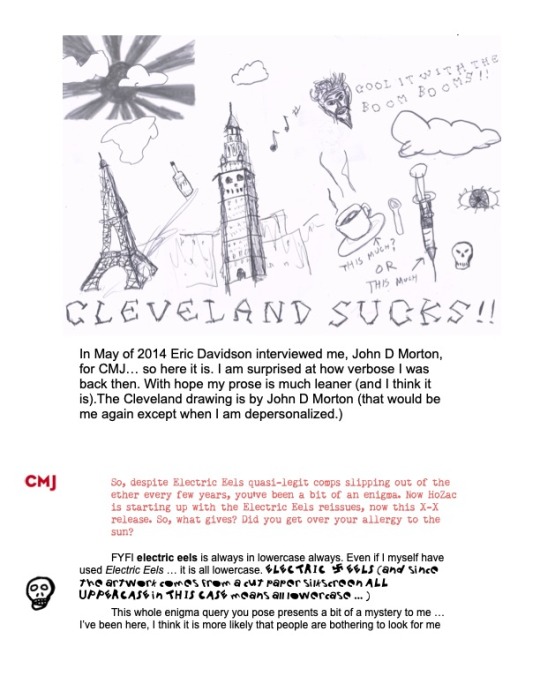
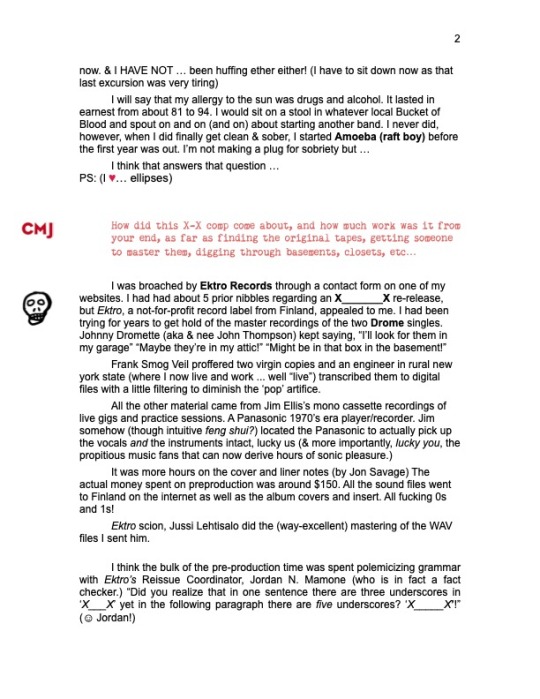
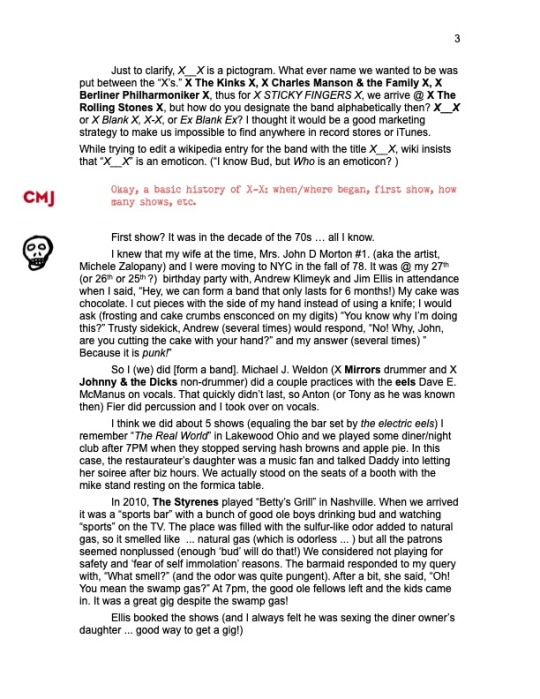

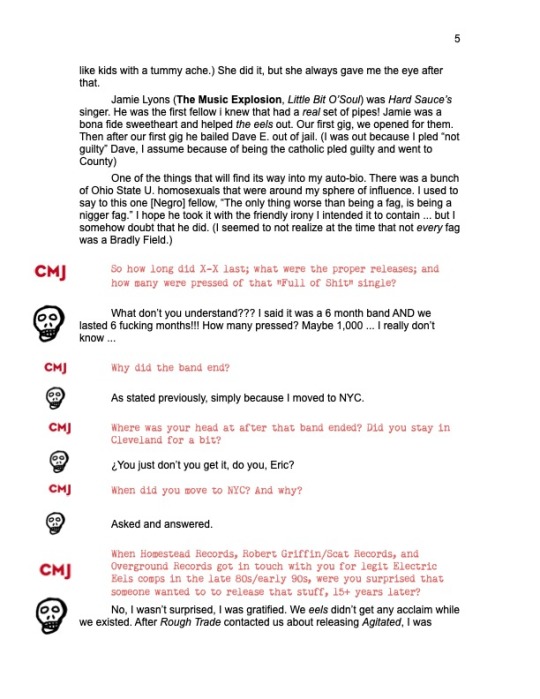

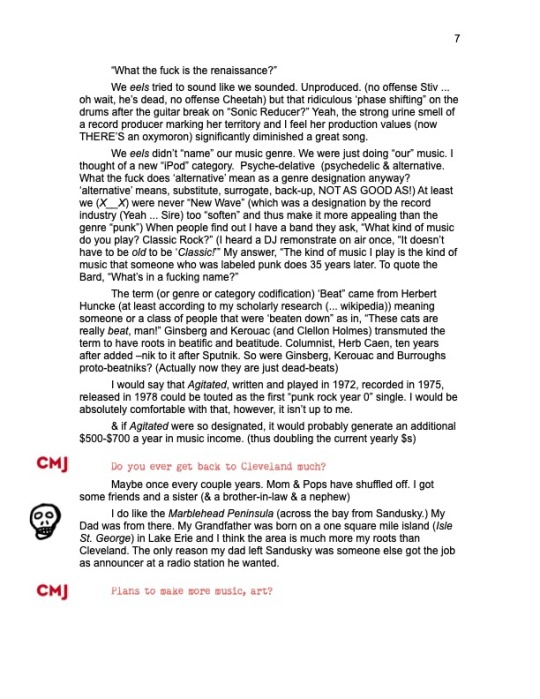
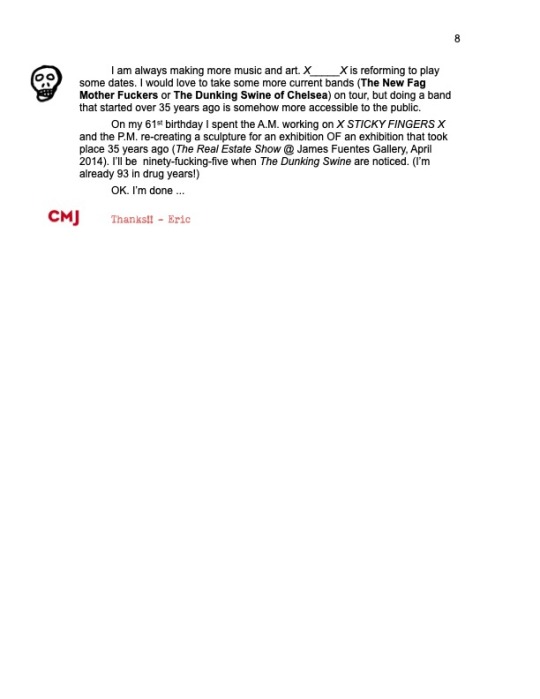

John Morton, 2016 swiped from his wife's Facebook.
youtube
youtube
#John Morton#electric eels#X_X#Cleveland proto-punk#cleveland punk#protopunk#smog veil records#rust belt#Youtube
4 notes
·
View notes
Photo
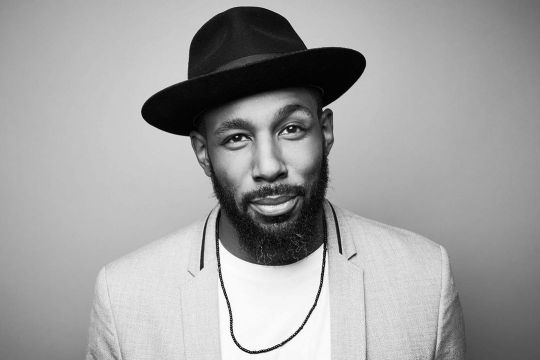
Stephen 'tWitch' Boss #gonetoosoon CARTER™️ Magazine carter-mag.com #wherehistoryandhiphopmeet #historyandhiphop365 #cartermagazine #carter #stephentwitchboss #rip #sip #blackhistory #blackhistorymonth #history #dj #staywoke https://www.instagram.com/p/CmJ-Q1mLL9S/?igshid=NGJjMDIxMWI=
#gonetoosoon#wherehistoryandhiphopmeet#historyandhiphop365#cartermagazine#carter#stephentwitchboss#rip#sip#blackhistory#blackhistorymonth#history#dj#staywoke
22 notes
·
View notes
Text
Sullen Girl
Fiona
SCalGentleman
1 note
·
View note
Text
@sarahspy is Sarah Lynn Knowles -- a Massachusetts-based writer, editor, and pop culture nerd who’s bounced between western Massachusetts, Philadelphia, New York City, and back again.
My fiction has been featured in Slice Magazine, Joyland Magazine, Vol. 1 Brooklyn, Perigee Publication for the Arts, and Sundog Lit. I was honored to workshop fiction in Tin House’s 2024 Winter Workshop and One Story’s 2023 Summer Conference.
I founded and edited Storychord.com -- a longtime, biweekly fiction journal that featured one story, alongside visual art + a one-song soundtrack, each by a different emerging artist. From 2010-2017, we published 150 multimedia issues (all archived here!) and hosted multiple SXSW and CMJ live music events.
I collect quotes and enjoy dabbling across creative arts like jewelry making, ceramic pottery, block printing, and photography.
Here's some of my very favorite fiction and, more broadly, 50+ of my favorite books 📚
Friend me on Goodreads, Pinterest, and Bluesky :)
PUBLICATIONS
“The Hotel Window” Atlas and Alice (January 2017)
“The Bee Sting” Sundog Lit (April 2014)
“Waitress” Vol. 1 Brooklyn (August 2013)
“Blackbird” Joyland (July 2013)
“Darlene” Slice Magazine (Fall 2010/Winter 2011)
“Camping” Perigee: Publication for the Arts (Issue 25, 2009)
Sparrow, self-published literary/personal zine (2004; archived)
“Elizabeth” Film & History (Vol. 33, No. 2; July 2003)
Cataclysm Girl, self-published literary/personal zine (8 issues, 1997-2001; archived here, here, and here)
AWARDS & HONORS
Tin House 2024 Winter Workshop, Accepted Fiction Participant
One Story 2023 Summer Conference, Accepted Fiction Participant
Honorable Mention, Glimmer Train June 2013 Fiction Open
Finalist, Northwind December 2012 Story Contest
Winner, Slice Magazine Fall 2010/Winter 2011 Spotlight Award
Finalist, Glimmer Train July 2009 Very Short Fiction Contest
3rd Place Winner, Perigee: Publication for the Arts 2009 Fiction Contest
Gold Award for Feature Writing, MarCom 2006 Creative Awards
0 notes
Text

Fiona Apple // photo Chris Cuffaro for CMJ magazine
245 notes
·
View notes
Text
Stereo Embers The Podcast: Stephen Fredette (Scruffy The Cat)
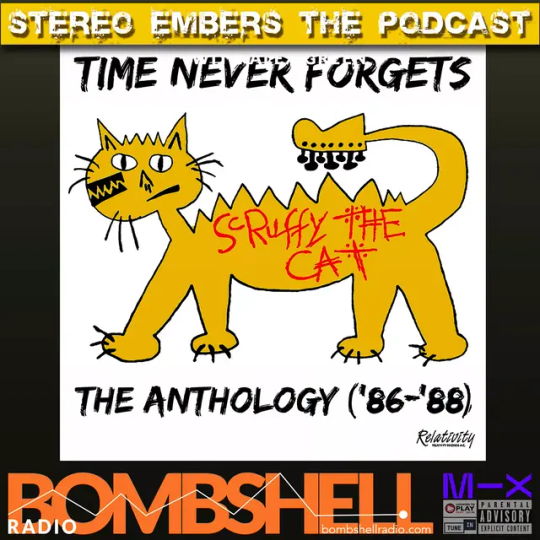
Thursdays 2pm-3pm EST 11pm-12pm PDT 7pm-8pm BST bombshellradio.com stereoembersmagazine.com Stereo Embers Magazine #StereoEmbers, #podcast, #RadioShow, #AlexGreen, #Nowplaying, #BombshellRadio, #StereoEmbersThePodcast Repeats Fridays 1am EST and Sundays 11am EST "Boom Boom Boom Bingo" Scruffy The Cat dominated the College Rock scene of the late '80s with a run of fabulous albums like Tiny Days and Moons of Jupiter, plus two stellar EPs High Octane Revival and Boom Boom Boom Bingo. If you don't have these four releases-get them. They're the most perfect blasts of rootsy indie pop you'll ever hear. The six member Boston outfit, which formed in '83 lasted just under a decade, breaking up in 1990. Over the course of their career they went Top 5 on the CMJ College Radio Charts, were played on MTV's 120 minutes, were critically lauded by pretty much everyone, including the Village Voice and The Chicago Tribune, cracked the Billboard Top 200 and toured with Los Lobos, The Replacements and Yo La Tengo. The six member Scruffy personnel consisted of Charlie Chesterman, Stephen Fredette, MacPaul Stanfield, Randall Lee Gibson IV, Stona Fitch and Burns Stanfield. Omnivore put out two great anthologies that celebrate the band's legacy and as far as alums go, Scruffy is down two men with the deaths of Chesterman and Gibson, but the music remains and it sounds as fresh as ever. As for Stephen Fredette, he's a marvelous and accomplished artist who did all the Scruffy covers, and he just had his first gallery show in the Boston area. And he's been working on some songs.... www.scruffythecat.com (http://www.scruffythecat.com) www.stereoembersmagazine.com (http://www.stereoembersmagazine.com) www.bombshellradio.com www.alexgreenbooks.com Stereo Embers Twitter: @emberseditor IG: @emberspodcast Email: [email protected] (mailto:[email protected]) Read the full article
0 notes
Photo
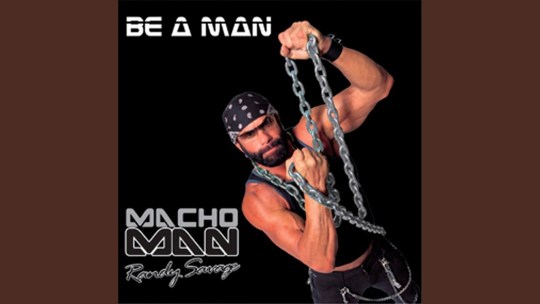
"Macho Man" Randy Savage's rap album is finally getting a vinyl release Back in 2003, the fan-favorite wrestler "Macho Man" Randy Savage released a hip-hop album titled "Be a Man." Why? Who knows. There wasn't even any notable producer attached. CMJ Magazine said Savage's flow was "surprisingly tight for a middle-aged musclebound beef jerky salesman with an audible constipation problem." — Read the rest https://boingboing.net/2023/02/19/macho-man-randy-savages-rap-album-is-finally-getting-a-vinyl-release.html
#Post#Video#hip-hop#Macho Man Randy Savage#Macho Man" Randy Savage#pro wrestling#professional wrestling#randy savage#rap#record store day#vinyl collectors#vinyl records#Wrestling#Thom Dunn#Boing Boing
0 notes
Text
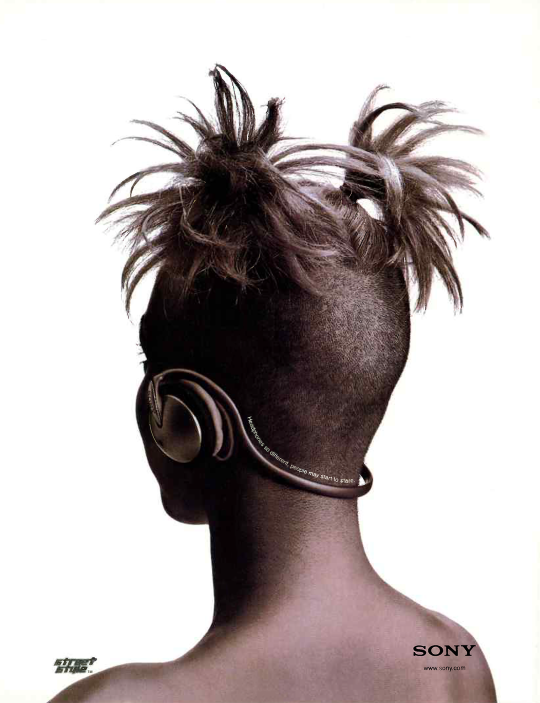
29 notes
·
View notes
Quote
Después de la gira, recordé algunas cosas y noté que me estaba convirtiendo en otro rockero idiota más. Cuando comencé soñaba con ser el Sr. Exitoso, pero nunca pensé que lograría algo. De joven no le gustaba a las chicas y no tenía talento para los deportes. Y de pronto eres rico, y tu nariz ya no es tan grande, y las chicas te buscan. Eso puede alterar a muchas personas.
Trent Reznor (octubre de 1997, CMJ Magazine)
1 note
·
View note